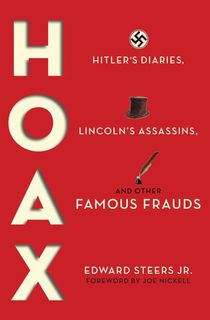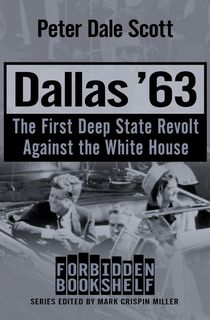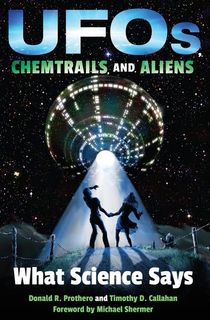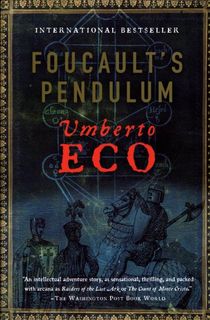You can be forgiven for thinking the world has gone mad lately. From autocrats who just won’t go away to immense numbers refusing to believe certified results, countries crashing out of trade agreements to outright refusals that a pandemic is plaguing us—the last five years have often seen truth and fact replaced by blind belief and sheer ignorance.
But conspiracies have long fascinated many on either side of the rational balance, and books like these help us piece together just how and why the world has become the way it is. Here, we look at eight of the best conspiracy theory books to make sense of our strange planet.

Hoax
Hitler’s diaries, the loin cloth of Christ, the missing link, John Wilkes Booth’s journal—these are just some of the hoaxes examined in Steers’ penetrative book. By tracing the many conspiracy-laden scandals that have plagued the world’s most important moments, Steers discovers how greed and our need for belief are powerful agents that can trick even the most intelligent of individuals.
The crux of Steers’ book lies not just the fascinating era-driven examples, but in the frauds themselves— in how even the most rational of experts can have the wool pulled over their eyes, with a surprising number of hoaxes still seen as truth in the collective mindset.

Dallas '63
Some believe that since the end of World War II, when the US took on the mantle as the world’s most powerful nation, a deep-state group of extreme right-wing individuals have been working from behind the shadows, manipulating the country towards war, with the ultimate goal of long-term global dominance. It all culminated for the world to see one sunny morning in Dallas ’63, when every faction of the government worked together to remove the country’s ‘king.'
Laced with obsessive details and references, Scott’s tome goes full-blown conspiracy on what many people suspect about the US, but can’t actually prove. And while at times it can seem repetitively far-fetched, it’s nonetheless fascinating reading about our current global superpower.

UFOs, Chemtrails, and Aliens
People want to believe, evidence (or lack thereof) be damned. From alien abductions to crop circles, giants that lived in South America to the pyramids built by advanced civilizations, there’s no amount of debunking or education that can topple some conspiracy-driven beliefs—although the authors here make a damn good case for science.
Taking a purely systematic approach to supernatural conspiracies, Prothero and Callahan analyze the psychology, history and reliability behind each one, balancing the clearly hokey convictions some might have (the amount of aliens seen in the US, for example), against possibilities that we just don’t know about (the high probability that there is life beyond our planet).
Related: 8 Books for X-Files Fans

Them
Jon Ronson, a man who never quite realizes when he’s taking things too far, goes deep into the world of fundamentalism, signing himself up for everything from the Ku Klux Klan and neo-Nazis to jihadists, to try and understand just what drives people toward their misguided ways of life.
Bringing his neurotic, acerbic wit to their many delusions of grandeur, Ronson’s own unique brand of gonzo journalism is on full display here, venturing to places where his life and limb are truly at risk. Written over 20 years ago, the stories can sometimes feel quaint—especially compared to the current era, when right-wing fundamentalism has seeped into the crevices and toward the world of leading politics.

The True Believer
There are a set of firm beliefs that overlap in those who attempt to influence the world, from political upheavals to mass movements. In this short, concise work, Eric Hoffer looks into the psychological and sociological tendencies that afflict these “believers,” using powerful, sometimes broad statements to make his case.
Hoffer was nothing more than a longshoreman with no formal education when he wrote this book, just a few years after the end of WWII. It wasn’t until President Eisenhower cited it as essential reading in the then-changing world that he vaulted into the public eye, and his influential work has been widely-read ever since.

Fantasyland
How does one make sense of this bizarre world we’re living in? Many point to the almost absurd influence of the US, its politics paving a path for the rest of the world to follow. Fantasyland traces the 500 years that led up to this particular moment, examining everything from the Salem witch trials to PT Barnum’s circuses, satanic worshippers of the ‘80s to the Hollywood marketing machine, in an attempt to understand the madness in its method.
Somewhat rant-like in its delivery, Andersen nonetheless is obsessive in his analysis, showcasing how America has and always will be a place of delusions, its country built on falsities and lack of perspective, and how its influence is almost impossible to contain, given the global state of affairs.

Foucault's Pendulum
Novels can sometimes be a better vessel for understanding certain demographics than non-fiction, and Eco’s influential work is the go-to for the world of conspiracies. Bored with the world of fiction, three publishers decide to start their own conspiracy theory as a game to see how far it can reach, tying in the Knights Templar with occult groups across the ages, leading to the eponymous pendulum in the middle of Paris.
A doorstopper of a novel that weaves as many intellectual exercises as its three characters attempt to devise, Eco’s book is both mastermind and maddening in its attempt to explain the horrors of conspiracies, and how easily one can get caught up in errors of our own devices.

The Plot
Groundbreaking comic artist Will Eisner released this as his last-ever work, both a challenging history and damning indictment of The Protocols of the Elders of Zion, that hateful anti-Semitic book that’s been used by everyone from the Tsars to Hitler in their attempts to justify horrendous actions.
Tracing the pamphlet’s forgery at the hands of the Russian aristocrats, Eisner level-headedly builds a coherent case of perjury that’s both journalistic and highly personal, simplifying the story in an attempt to reach as wide an audience as possible, so that the book will never be taken at face-value again.




